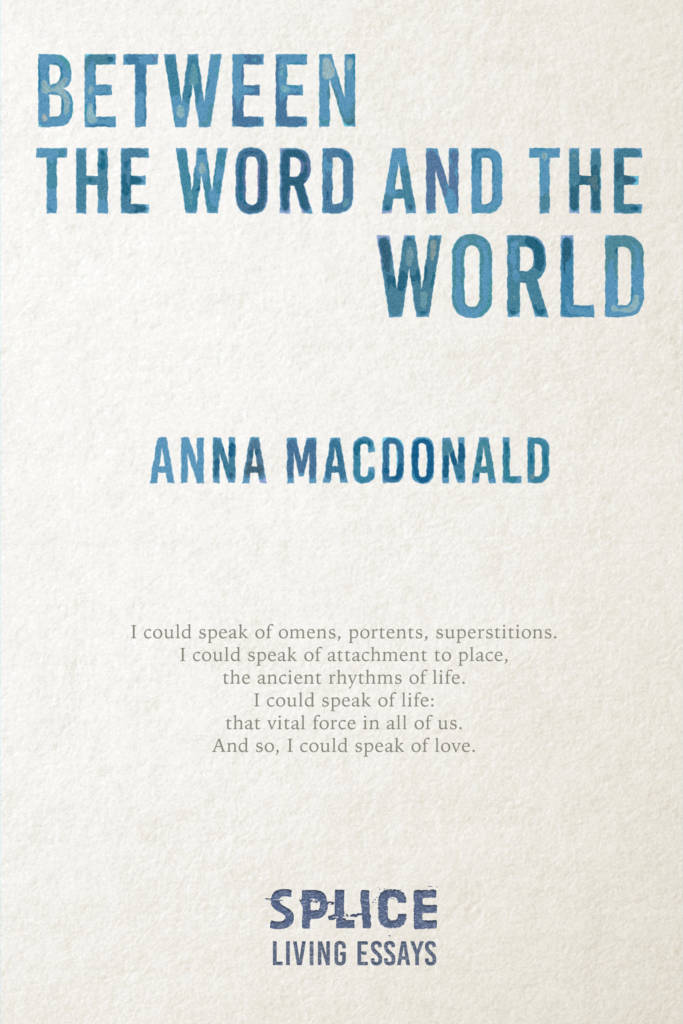Branching Outwards
by Lisa Gorton
This was the opening address delivered at the launch event for Anna MacDonald’s Between the Word and the World.
Paperback: £9.99

This book starts with Iain Sinclair’s shoes. There’s a story about them, and it leads to the discovery of a book, and this discovery of a book — its pages ‘dense with signs’, with coffee stains, dog ears, underlinings, marginalia — leads to memories of walking, and these memories of walking reveal how, over the course of a life, ‘walking and reading, reading and being in the world, became one.’
This is a book about reading as an experience of the world. Anna’s sentences and paragraphs and essays alike keep branching outwards. They start with a boundary crossing. Sometimes this is an incident in a book: ‘A young woman leaves her home and family…’ Sometimes it is an incidental shift in the day: ‘Now…’, ‘When I woke…’, ‘I’d forgotten…’, ‘Perhaps…’. From that precipitant, the essays advance not along one single line of thought but along many lines crossing from book to life, from life to book, from book to book, freely. The mode of this book is not emotion recollected in tranquillity. Instead, it traces the moment-by moment experience of reading as an experience of life, a work of discovery.
The books that she reads themselves branch out. In her copy of Teju Cole’s Blind Spot, she writes, she finds an ‘index card covered on both sides with names and titles. From Teju Cole, Edna O’Brien, Homer, Caravaggio, Emily Dickinson, Nadia Tuèni, Arthur Conan Doyle, Merleau-Ponty…’ This is one of the ways in which, in these essays, reading and walking serve as images of each other: each open out at each point into fields of options: other books, other places, other angles back. Her experience of reading is like the experience of walking, where there is no still centre and place is accidental, interinvolved, opening out from each point anew.
This perpetual forward movement is one source of the book’s vitality. Another is its interplay of different ways of seeing, different frames. Anna writes: ‘Soon after I began reading Esther Kinsky’s River, I went out in search of a magnifying glass. Early one Sunday, I drove east to the neighbourhood of my childhood and scanned the tables of the fleamarket… This was the same table where, years ago, I had salvaged a cardboard box of photographs…’
A book, a river, a magnifying glass, a box of photographs, a move not only to another place but to another time: variously, these essays gather together such varied ways of seeing. On a page, in a place, in close-up, in memory, through a frame, the essays set up a dramatic play of perspective. As a reader, you feel a kind of flickering in your vision, a quick subtle free movement from inside to outside each experience and back again.
To be a writer in this rich country, in these poor times, is to feel on the defensive, not only financially but also imaginatively, answering for the value of writing itself when the only question most people want writers to answer is how many copies of their books they sell. Poetry, short-stories, essays, formally experimental prose — these are held in the margins, in this rich country, in these poor times. Anna’s book is exhilarating because it has kept a sense of free imaginative movement. It is written with ease, in an intimate, clear, digressive style. That is, it is written with the conviction that all this matters, that it is not a matter for specialists, that the experience of reading, which it at once offers and describes, is a common inheritance, open and free, unfenced.
Between the Word and the World claims, as its right, the freedom of reading. It grants literature the right to keep, as the origin of its radical power, the nature of an artform. Everywhere, in its free movement between the word and the world, Anna’s book assumes the right to see literature, not solely as a commodity to dull the passing of time, not chiefly as a machine for creating characters that we can ‘identify with’, avatars of our vanity — but as a way to discover reality, wider and stranger than our habits.
About the Author
Lisa Gorton is a poet and novelist, essayist and reviewer. Her first poetry collection Press Release won the Victorian Premier’s Literary Award for Poetry; her second, Hotel Hyperion was awarded the Philip Hodgins Memorial Medal; her third, Empirical, was shortlisted for the Prime Minister’s and NSW Premier’s Literary Awards for Poetry; and her fourth, Mirabilia, was shortlisted for the NSW Premier’s Literary Award for Poetry. Her novel The Life of Houses was the co-winner of the 2016 Prime Minister’s Literary Award for Fiction. She is the author of Cloudland, a novel for children.
